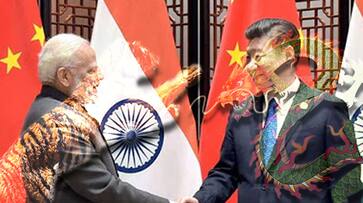Deal with the dragon: Russian roulette forces China to side with India against Pakistani terrorism

The BRICS summit at Xiamen has many positives for Indian diplomacy. For the first time, China had to agree that not just India, but all participants perceive Islamic terrorism originating from Pakistan as a clear and present danger.
This was a significant lesson for China which has been shielding terror havens located in Pakistan. By formally naming the two Pakistan-based terrorist groups, Lashkar-e-Taiba and Jaish-e-Mohammad, in the Xiamen declaration, and expressing “concern” about the security situation in the region and violence caused by these outfits - New Delhi was able to get the participating countries address its core concerns. This is a major diplomatic breakthrough for India, and it also gives BRICS renewed relevance. Going forward, if China still continues to oppose India’s initiative of declaring Masood Azhar a global terrorist at the UN, it will belittle its own declaration and undermine BRICS diplomacy. That does not seem to be a viable option anymore.
A Russian Shock for China
The Chinese found to their surprise and that Russia prefers to be neutral at BRICS in general and on the India – China relations in particular. It was this Russian neutrality that may have forced China’s hand on the terror groups. China is negotiating a $30 billion gas pipeline with Russia and had finalized $10 billion in arms sales over the last three years. In the same period, Russia invested $12 billion in just one deal – buying Essar oil last month in India and finalized $5 billion in weapons sales. Clearly, India has as much leverage as China does with Moscow. For the Chinese, the real message of this summit has been the realization that its relationship with Russia is mercantile and not as yet strategic in nature. Russian neutrality thus will remain a critical factor for the future success of BRICS.
The Xi - Modi bilateral also got positive outcomes for both countries. India showed strategic foresight by not mentioning terrorism in the bilateral and having a forward looking approach after the tense 73 days Doklam standoff. Xi Jinping’s call for stability in the relationship and his desire of putting it on the “right track” signal a degree of normalization between the two Asian giants. Significantly, Indian foreign secretary said that peace and tranquillity at the border areas is a prerequisite for fruitful relations between India and China. The use of the Word: “prerequisite” is crucial – India sent a signal to China that you cannot pick fights at the border and hope to take the relationship forward.
BRICS Moderates China?
The Multilateral element at BRICS is fast turning out to be a moderating influence on Chinese international relations. China is suddenly under pressure on many fronts. While the Doklam standoff was happening in India, the US upped the stakes in the South China Sea by aggressive maritime movement in waters claimed by China. Vietnam also had more aggressive naval drills. Foremost of course were the Hydrogen bomb and ICBM tests by North Korea. The Chinese obsession with keeping a disunited Korea at the cost of cozying up with Pyongyang has run its course. Now Beijing finds itself in a corner where it can no longer support North Korea nor can it allow increasing influence of the US in its backyard. Any war will have a catastrophic consequence on the stability that the Chinese communist party so prizes. The North Korean distraction is taking a big toll on China’s foreign policy and it has to make significant diplomatic concessions elsewhere.
Buying time or looking ahead?
China’s track record with regards to honouring international agreements has been patchy. The results at BRICS underlined changed international circumstances and displayed famous Chinese pragmatism. On October 18 the Chinese communist party will convene the 19th party congress, its highest decision-making body. This will affirm Xi as the all powerful leader of China. It remains to be seen if Xi will remain committed to peace and stability in his renewed five-year term. India may have got many concessions at the BRICS summit, but it can ill afford to assume that relations with China are back to normal, just yet.
















